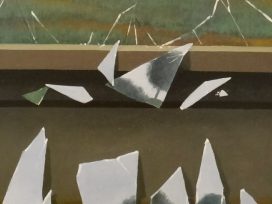In the war
In 2008, Belgian journal ‘La Revue Nouvelle’ published an interview with Arkady Babchenko, in which he explained why his experience of serving in the Russian army in Chechnya had motivated him to become a war reporter. In light of Babchenko’s recent staged murder, in order to foil a genuine assassination plot, the interview makes for chilling reading.
Arkady. The minute he starts to talk about it his lips begin to tremble. Afterwards he needs five or six beers and loads of cigarettes. He smokes them feverishly, one after another, lighting the next from the fag-end of the last. For him, it’s a way to recover his taste for living. Maybe that’s it: he has to burn up his life, boost his nicotine level to the point where he can simply face up to it. To life, that is. He tells his story, he’s not pretending, he’s not lying. He accepts responsibility for it all. He faces up to it. He digs deep, he analyses, he describes.
He writes too.
It all gets tangled up; it goes round in circles. It’s hard to sort out. As he says, despite his efforts to look at it every which way, he can’t be sure that he’s really answered the question.
Then again, it’s sometimes perfectly clear, perfectly black and white.
‘I was in the war and the war was in me. When I returned to Moscow, I just hung around for two years. I just wasn’t myself. Yes, of course, I did take up my studies again, just as my mother wanted me to. It was my mother who had come looking for me twice in Chechnya to bring me back home.
It’s quite simple. On 10 August 1996, we were setting off for Grozny,1 from Mozdok, a town in Northern Ossetia where we were billeted. On the sixth of August, the boeviki (Chechen fighters) had entered the town and we had to go and fight them. Just as I was getting into the back of the truck the soldier in charge of mail arrived with a telegram in his hand. He called out: Babchenko?
Yes, that’s me.
Your father has just died. You’re off to Moscow straight away; you’re not going to Grozny. Get out of the truck.
My first thought was: Oh, yeah, right, my father has died. And you’re the pope, right? I didn’t believe it for a second.
And then I realized. It was unbearable. It just couldn’t be. It was as if the ground was being cut from beneath my feet.
Now, when I relive that whole “film” and think about it, I come to the conclusion that my father actually gave me my life twice over. The first time was in the “normal” way, in 1977, the year I was born. The second time was on that tenth of August 1996 when he died instead of me. If I had gone to the front that day, I would never have come back. Deep down inside of me I’m sure of it. He changed my fate: of the 96 chaps in our battalion that set off for Grozny only 42 came back alive. Already, in the plane taking me back to Moscow, there were only wounded or tzink – “remains” of an earlier relief force that had gone to fight in Grozny at the time of the Chechen offensive of 6 August.’
Arkady pauses and sucks on his nth cigarette. His fingers are trembling. This is a story that he’s already told before. He’s written it down as well. But even though he’s telling it one more time, it is not done with the kind of automatic delivery of a ‘professional witness’. No. He enunciates every word with a mixture of effort and deep distress. It is as if telling the story was making him relive events exactly as they occurred in terms of their precise chronology. As if doing so forces him to relive every image, every sound.
Tsink stands for tsinkovye groby, Russian for ‘zinc coffins’, something that Svetlana Alexievitch2 discussed at length in her book on the Afghan syndrome. Afghanistan, Chechnya: a different epoch but the same syndrome. The same kind of young lads, with hairless chins, blithely setting off ‘to plant apple-trees in Afghanistan’, came back haggard, empty-eyed, so that their mothers could not even recognize them. Afghanistan, Chechnya: a different epoch but the same syndrome. As for the tsink whose absent presence surrounded Arkady in the plane, Chechnya did not just change their lives; it simply took them.
And then, there were the ones who held on to their lives but whom the war held on to. Their bodies came home, but not their souls. Arkady is one of those.
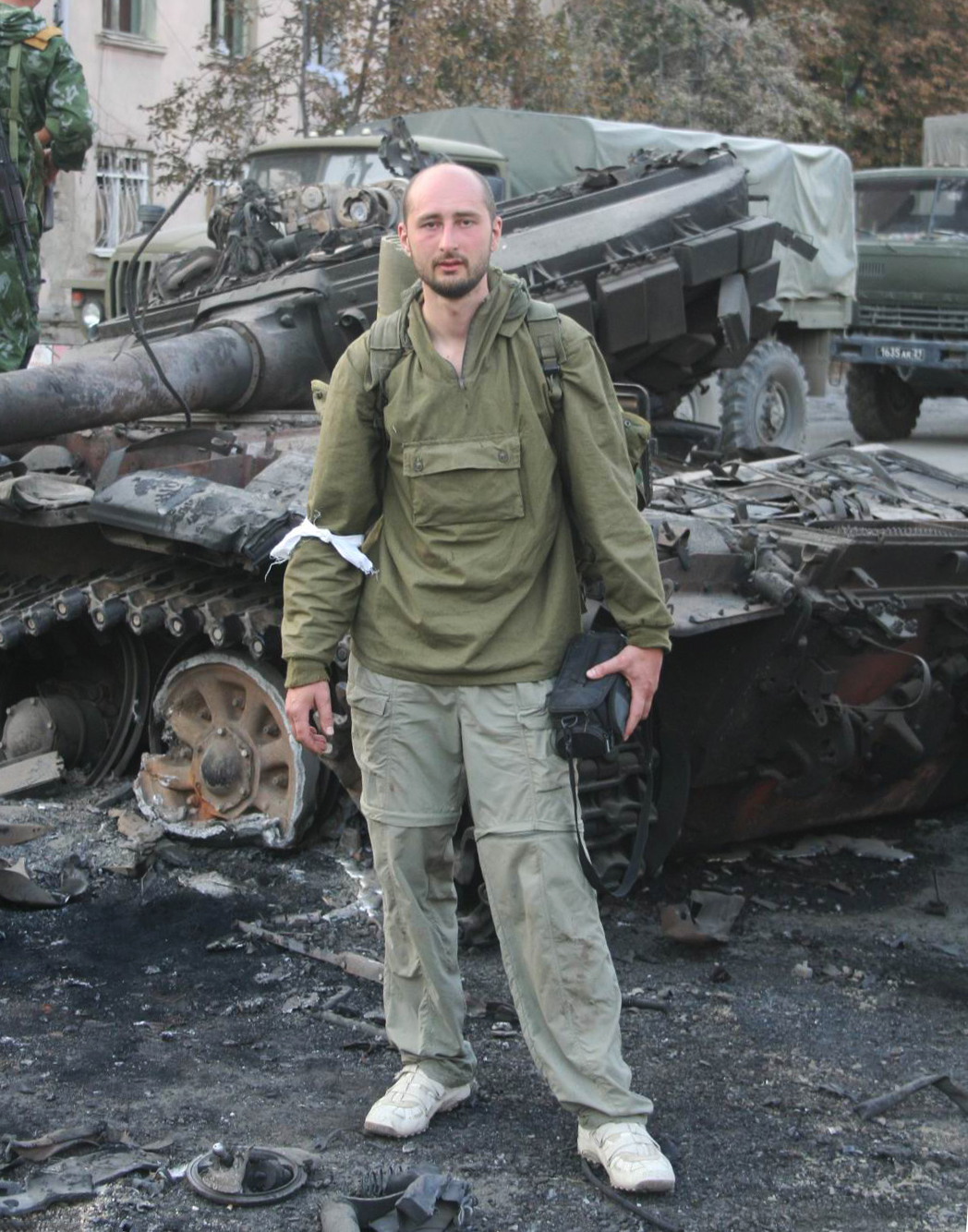
Arkady Babchenko in 2008. Source: Wikipedia
A ‘different person’
‘In the plane I was the only person who was alive and not wounded. During the two-hour flight I kept my eyes fixed on the porthole and on the certainty that, when the plane landed in Moscow, there would be masses of people in the streets shouting “Yeltsin, murderer!”, “Bring our sons home!” In short, I was sure that our society would do the same as American society had done during the Vietnam war, that they would just say “No, no, no”. What else would they do?
But when I disembarked there was not a soul. No demonstration, no meeting. Nothing. Silence. A silence that was stifling, suffocating. Young people, who couldn’t care less, busy swigging beers in the parks and “enjoying life”.
When I got home I switched on the telly. Obviously, there would be non-stop reports on the hell that was Chechnya. No, there weren’t. So I surfed the channels and came across one presenter in a nightclub, with a microphone in his hands, carrying out a sort of auction in front of stupefied spectators, whose task was to guess the value in dollars of the diamond necklace being worn by that day’s guest celebrity.
Well, when that sort of thing happens, your world turns upside down; you realize that your entire being has stayed back there in the war. There’s no one to share it with. As regards my mother, it’s as if some sort of taboo has been declared. We had a sort of unspoken ban on talking about it at all. That lad who had gone off to war, her little boy with the long hair, who was just a touch idealistic, a bit devil-may-care, she never saw him again. I think that it’s no coincidence that it was at that point that she started adopting children. It wasn’t her son who came back; it was someone else.
When you get back, you’re left to your own devices.
Our state is rather ungrateful. Once you are barely eighteen years old, the army comes along and drags you away from your mother’s skirts so it can send you off to war. It’s no use protesting and you don’t necessarily want to otkosit (pay for a medical certificate to be excused military service, dodge the issue, take a short cut). And, when you get back, the army sends you off into the wide blue yonder; it spits you out into society again, with all its scorn and all its indifference. There’s no thank you, there’s no see you later, what will be will be, if you’re suffering, you’ll just have to cope with it – whether you’re missing a leg, have a gaping wound … or your soul is in turmoil.3
Nobody to talk to. The only thing that the guys at uni were interested in was passing their exams. If they got a mark of 2 it was a tragedy.4 Under the circumstances, you’re not going to talk to them about what you have seen, what you have lived through, are you? You’re not going to tell them about your nightmares, about the war that hasn’t gone away and comes back every night. You won’t tell them about Igor. He’s there, calling to me, talking to me. I should have died instead of him. When you are in the war, if a mate dies, you immediately think that it’s you that should have died. And you never forgive yourself for it. I can see him walking towards that hill. He throws a grenade in front of him because he’s spotted the outlines of some of the enemy. ‘Someone’ fires from the hillside and he falls, onto the grenade that he’s just thrown. It explodes under him. Instant death.
The war changed everything in my life. It changed my whole life. If things had been normal and had gone “according to plan”, I would have had to “become what I hate” today; by now I would most probably have become a business lawyer, because I’d studied law: I’d be riding around Moscow in a Mercedes and be as rich as Croesus.’
Dedovshchina
‘During the “first Chechnya”5 I was afraid. To tell the truth, I was more afraid of my seniors, the “grandfathers”,6 than I was of the Chechens. During the first six months of my service in the Urals – at Elan Base, set up at the time of the Afghan war and updated to be used as a training centre for conscripts for Chechnya – I was submitted to a “hazing”. But once I arrived at Mozdok, in the northern Caucasus, that was when I really found out what is meant by the word dedovshchina (hazing).
By comparison, the hazing I had been subjected to in the Urals was almost like heaven: just a bit of “television” and a bit of “dried crocodile”. “Television”: your body has to form right angles. You’re holding a chair and your arms have to form a right angle with your body, then your thighs, then your feet – they all have to be at right angles (he demonstrates). “Dried crocodile” means holding yourself up horizontally above your bedstead, with your arms hanging onto the head-end rail and your toes onto the other end. You have to hold the position for as long as the “grandfathers” tell you to. After that, comes the super-humiliating punishment: scraping out the shit from the lavatories with a razor-blade. You have to clean the whole thing, even the pipes. You don’t need me to do you a drawing. And that can go on for hours.
At the end of the six months that we spent in the Urals, the major got us together and swore to us that we wouldn’t be going to Chechnya. Yes, we would be going to the northern Caucasus, but not to Chechnya. Nevertheless, when we arrived in Mozdok we understood straight away. The “grandfathers” who had already put in a year’s service and were coming back from Chechnya took it all out on us. Chechnya had made them blazing mad and they were taking their revenge on us. So, in that place, if you did not get hit at least ten times a day then that was a red-letter day. They would wake you up in the middle of the night yelling: “Go and get me a kilo of bananas or I’ll beat you up!” OK, so where are you going to get hold of a kilo of bananas at two o’clock in the morning outside a military base? Obviously, it can’t be done. So they beat you up. There are forty of them, so there’s nothing you can do about it. They’ll shoot between your legs as well; in fact, some of them sleep with their Kalashnikov. Dedovschchina is simply carnage. The Defence Ministry itself has recorded figures of hundreds of deaths in the army annually outside of military operations.7
Electric shock treatment? Not to be missed. They ask you, ironically: “Going to give Mummy a ring? Going to talk to Mumsie, eh?” And there you go; they attach the clips to your ears and crank the handle. “Is the call going well, then? Is Mummy well?”
As for sexual abuse, personally I never experienced it. But in the dormitory next door there was an instance of opuschchenie.8 Yes, that’s right, rape involving sodomy. You wouldn’t come out of that alive – at least, psychologically. It was a case of five against one.
Arkady, son of Arkady
When my mother came to fetch me the first time from the Caucasus in spring of 1996, it was so that I could see my father, who was seriously ill. Ill with alcohol, sick with despair. In Soviet times he had been an engineer, building parts of rockets. He had been very proud of his work in the service of Mother Russia. But, when the Soviet Union collapsed, he collapsed with it: no more orders, no more work. He had lost everything: his work, his dignity, his self-respect and the motherland to which he was devoted. It was alcohol that killed him.
When we saw each other the first time I came back, we hardly spoke. In silence we looked at each other, but both of us knew perfectly well that this was the last time. I’m very much like him. I have the same forename as him, Arkady Arkadyevitch, Arkayd son of Arkady.
After his funeral in Moscow on 12 August 1996, I was in hospital for twenty days, suffering from dysentery. As a result, I exceeded the ten days’ leave I’d been given for my father’s burial and for spending time with my mother. So as to “do the right thing” I went and reported to the military command office in Moscow but they nicked me: I’d overstayed my ten days’ leave – even though I had been sick as a dog. It made no difference: three months in the glasshouse for desertion. Do they beat you up in the glasshouse? Well, obviously, it wouldn’t be the Russian army if they didn’t (Laughs).
By the time they let me out, the first Chechen war was over, so they sent me to do my service in Perm.
After that, I just hung around in Moscow for two years from 1997 to 1999. I took no interest in anything; I was a stranger to myself and to the world.’
A drug
‘So why did I go back, having signed on, when the war broke out again in 1999? It’s something that shocks a lot of people. I’ve thought about this and I’m not sure that I’ve found the answer. What I am sure about is that it wasn’t for the money. Nor out of patriotism. How could I still want to serve the state that had just thrown me away like that when I got back and had put me in the cooler when I was actually doing my duty by coming back? No, it was something else. A sort of addiction: I had understood that I had left my life down there. In fact, if the war had been in Ekaterinburg,9 I’d have gone off to Ekaterinburg. If it had been in Moscow, then I’d have gone to Moscow. So, the point was, quite simply, that I had to go off and be in the war, so when I heard that operations were beginning again in Chechnya I didn’t hesitate for a second. To tell the truth, I was certain that I wouldn’t come back, that this time I would be killed: it wasn’t ‘natural’ to get away from Chechnya without a scratch several times in succession. We have a saying in Russian: “You don’t get out of the water dry” … It wasn’t “natural” for my father to have died instead of me. This time it would be my turn.
When you’re in the war you have one obsession, one imperative: to stay alive. In a way, your mission is simple; you know what you have to do. Every bit of your energy needs to be focused on that. You have a sharpened sense, “super-sharpened” even, of life, of what it means to be alive; you can feel this sharpness throughout the whole of your body.
In combat, the heightened adrenalin confers a feeling of euphoria; it’s no coincidence that, after fighting, soldiers often laugh.
The truth is that war really is a drug, a poison, crap that gets into your brain, a narcotic. Whatever you do, you mustn’t taste it, because, once you do, your whole being is contaminated, and no one in our society has invented anything to deal with this sickness that sneaks into you, this “Chechen syndrome” that transforms you in your innermost being, that turns you into someone else, something else. An animal. Once it’s happened, you have to constantly establish control over your body. You have to find a way for your brain, which has learnt ‘Thou shalt not kill’, to control this body which has imprinted on it the “save your skin reflex” to be invoked preventively, when necessary, by killing the one who might kill you first, just like they taught you in the barracks.
I can sense demons inside me. They are in there, prowling about. I know that I could kill, quite easily, in fact. God grant I never find myself in the middle of a brawl in Moscow…
When you’re in the war, you learn that life is at the same time very tough and very fragile. Tough because, once life is under way, it will wriggle, fight, resist do all it can to “hang on”. Life is incredibly stubborn. But you also learn that there are such things as vital organs and that, if you hit them, then it’s radical. Fortunately, I didn’t kill in Chechnya, I’m ninety-nine percent sure of that. But it’s just a matter of chance: I could perfectly well have killed. In the war, you kill, it’s almost inevitable. For a moment I even wanted to kill; to avenge my friend Igor. But ne popalo (‘it didn’t fall out that way, it didn’t hit’), the bullets I fired hit nobody. It’s just a matter of luck. People always think that war is like you see it in the cinema, that you can clearly see who you’re killing. No. You can just pick out silhouettes, shadows; you see movement in a group of trees, grenades or flares. And you fire, because you are afraid, you’re shaking like a leaf, and so you fire, to save your skin.
I would not allow myself to describe the suffering of the Chechens, because that is not my story and, like it or not, they were presented to us as enemies, even though I have nothing against them as individuals. But could Erich Maria Remarque have described the suffering of the French in All Quiet on the Western Front? It would not have been sincere and it would have been pointless. I have nothing against Chechens even though I’m terribly afraid of them. I remember how, during the first war, we were advancing in an armoured column between these faces of women, men and children who were looking at us with expressions filled with hatred. Fear, then, was everywhere and weighed on us like lead, fear that shut us in on all sides. Then, after a little while, you are not afraid anymore; your body has had enough of being afraid, it can’t produce that much adrenalin. In a way, it’s not a good thing not to be afraid any longer because you switch yourself off.’
In a single spurt, in the metro
‘When I got back from the “second Chechnya” (we went on strike to be demobilized because once the operations we were involved in were over, there was nothing left for us to do, and the army command had transferred us to the north of Terek), it just left me, all at once, in a single spurt. I had to extract the war from me and “extract myself” from the war. Well, one day, I was in the metro and it happened all by itself; it left me. I grabbed a pencil and some paper. And I wrote. That is where my novellas came from, one after the other.10
At the same time, I began to help “veterans” of Chechnya, who were just as exhausted and thrown on their own resources as I was. Out of all my Chechnya comrades, two-thirds had started to drink. I went to great lengths to find crutches for one, a wheelchair for another, a bed in a hospital for someone else; all this took my mind of my own pain that was gnawing away at me, that still gnaws away at me.
Then I got together with a friend and we launched a journal, combined with a website, offering novellas and literary accounts from former soldiers.11 And on that website you can see that war is a drug everywhere: Iraq, Algeria, the Falklands, Afghanistan, World War I, World War II – all the same nightmares. I know that these wars are different, but the nightmares that haunt the sleep of former soldiers, they are all the same. Exactly the same. You know you’re going to kill, you have butterflies in your stomach, you wake up sweating, you call out in your sleep. In Ireland, at a literary festival, I happened to be sitting next to an American ex-soldier who had been through Iraq and had become a writer. When he said “Abu Ghraib”, I heard “Chernokosovo”.12
After a two-year interruption, I’m again working at Novaya Gazeta.13 I had had an overdose: writing about war, talking about war, so I worked as a taxi-driver for two years to recover my strength. Then I went back to the newspaper. I remember something that Anna Stepanovna [Politkovskaya] said: “Our society suffers from civic immaturity”. That’s the best description of our society that I’ve ever heard. When everyone has had it up to here with the kind of consumption to excess that makes people dizzy to the point where they’re intoxicated with it, then there might be a bit more civic commitment. When I came back from Chechnya I thought that I was going to shout throughout all of Russia that this butchery had to stop. But no sound emerged. Now I say to myself, perhaps more modestly, that if my articles about abuse in the army, about organ-trafficking, about the situation of returning soldiers can make people more aware, even if it’s only a fifteen-year-old kid, that war is horror, that it’s a poison, a drug; and if I can manage, by means of a few articles and reports, to widen the circle of “thinking people” in Russia, even if that means just adding one little kid, it won’t all have been completely in vain.’
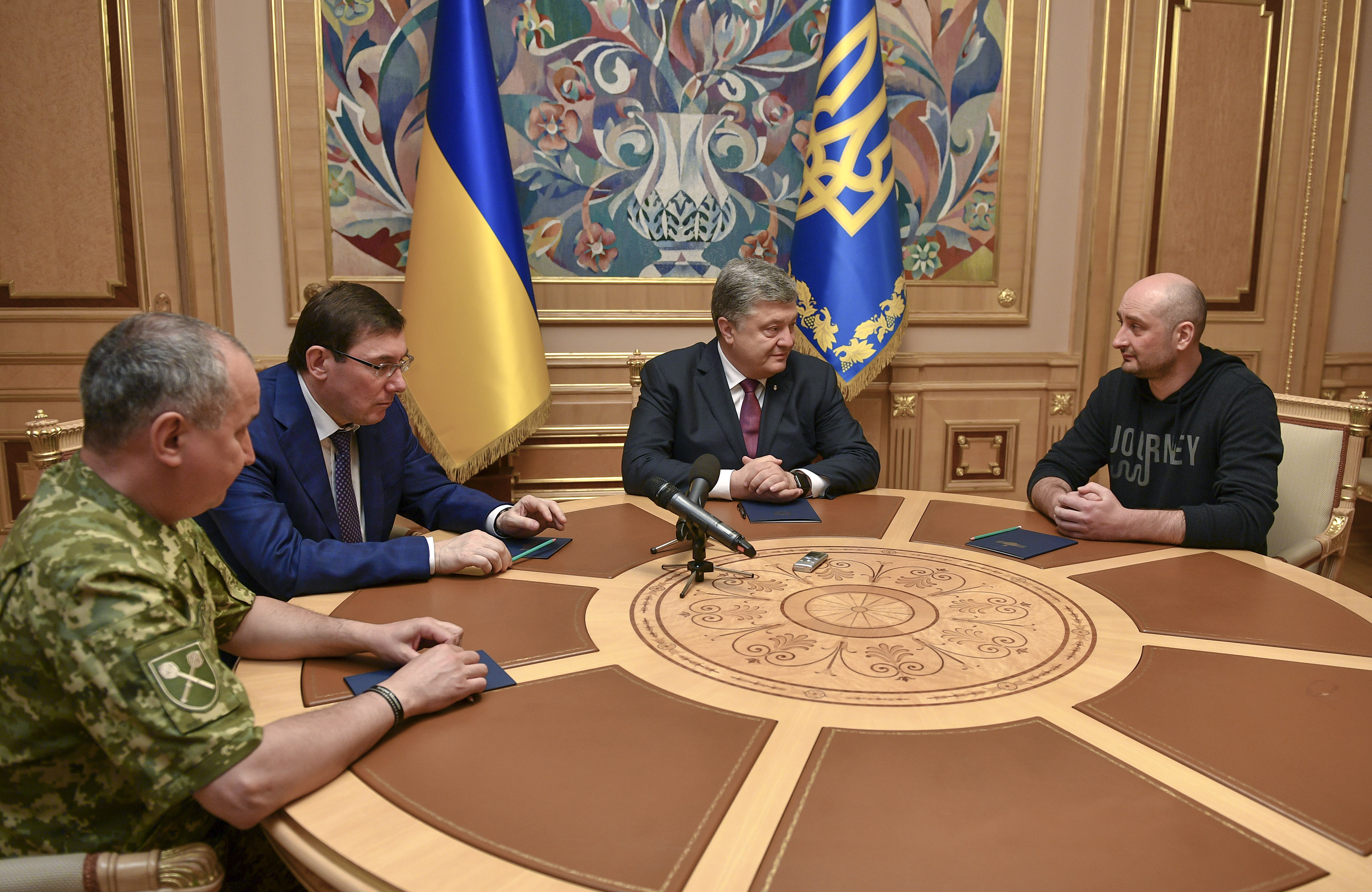
Arkady Babchenko with Petro Poroschenko following his staged assassination, 30 May 2018. Source: Wikipedia
The ‘first’ post-soviet war in Chechnya began in December 1994 while Boris Yeltsin was president of the Russian Federation. In August 1996, Grozny, the Chechen capital, was recaptured by Chechen combatants following very violent fighting. The first war, which caused thousands of civilian deaths (Chechens, but also Russians living in Grozny), was brought to an end by a ceasefire that came into effect on 31 August 1996, following negotiations between Maskhadov and the Russian General Lebed, under the auspices of the OSCE. After an interbellum period involving a chaotic form of pseudo-independence, hostilities resumed in September 1999.
Svetlana Alexievitch, Boys in Zinc, Harmondsworth: Penguin Classics 2017.
On the state of the Russian army, see inter al. Anna Lebedev, Valentina Melnikova, Les petits soldats, Paris: Bayard 2001. See also: Anna Politkovskaya, Putin's Russia: Life in a Failing Democracy, 2007. On soldiers’ mothers, see: ‘Les Folles de la ruelle Loutchnikov’ [The madwomen of Louchnikov alley], in Thérèse Obrecht, Russie, la loi du pouvoir, Paris: Autrement 2006. Anna Lebedev, Le cœur politique des mères, Analyse du mouvement des mères de soldats en Russie, Paris: Éditions de l'EHESS 2013.
The marking system in the USSR, which is still applied in modern Russian universities and schools, ranges from 1 to 5. To pass, you have to get a 4 or a 5. A mark of 2 is a disaster for the pupil or student.
This way of referring to the wars, omitting the word ‘war’, became widespread in Russian society and amongst soldiers. They spoke of the ‘First Chechnya’ or the ‘Second Chechnya’, which, of course, referred by a process of synecdoche to the first and second wars (respectively 1994-1996 and 1999-). Anna Politkovskaya entitled one of her works in Russian on the second war Vtoraïa Tchetchnia [The Second Chechnya].
In the language of military service, the ‘grandfathers’ (dedy) means those who are in their second year of service (until 2008, Russian military service lasted for two years; more recently, it has been reduced to one year). It is they who violently abuse the duhi (the younger recruits).
The Defence Ministry put the number of deaths in the first quarter of 2008 at 200, see: Obshchaïa Gazeta, 2 July 2008, http://og.ru/news/2008/07/02/40525.shtml. In 2005, over 1,000 soldiers are reported to have died outside combat, a figure that fell to 442 in 2007. However, the number of suicides is reported to be rising, with 224 suicides in 2007.
Literally, ‘degradation’; the term can convey any kind of sexual humiliation.
Ekaterinburg, formerly Sverdlovsk, is a Russian town in the Urals, therefore many long hours by train from Chechnya. There have been no military operations there since World War II.
One of them, Le songe du soldat, was published in Des nouvelles de Tchétchénie, Paris: éd. Paris Méditerranée 2005, translated by Anne Le Huérou and then in La couleur de la guerre, Paris: Gallimard 2009, translated by Véronique Patte. It is published in English in Arkady Babchenko, One Soldier’s War in Chechnya, translated by Nick Allen, London: Portobello Books 2007.
See: www.artofwar.ru
Chernokosovo became unfortunately famous as a (pre-trial??) detention centre where Russian soldiers carried out torture at the beginning of the second Chechen War.
Novaya Gazeta (http://en.novayagazeta.ru/ for the English version) is the newspaper where Anna Politkovskaya worked. Arkady Babchenko works there and deals with some of the subjects that Politkovskaya wrote about until she was murdered in 2006, especially the situation in the Russian army.
Published 8 June 2018
Original in French
Translated by
Mike Routledge
First published by La Revue nouvelle, October 2008
Contributed by La Revue nouvelle © Aude Merlin / La Revue nouvelle / Eurozine
PDF/PRINTPublished in
In collaboration with
In focal points
Newsletter
Subscribe to know what’s worth thinking about.
Related Articles
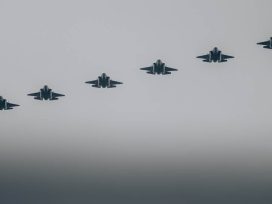
Russian drones entering Polish airspace, militarily seen as intensified provocation rather than open warfare, have nevertheless provoked costly responses – both from NATO’s air defence systems and civilian reactions to disinformation. A war correspondent’s view of what can be done technologically – for greater military efficiency and improved civil defence.
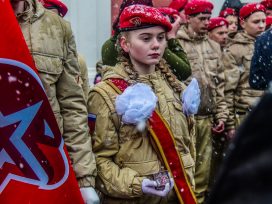
Intellectual violence
The militarization of education in Russia
Education has become another battleground in the Kremlin’s campaign to militarize the Russian public consciousness. Youth organizations, book bans, changes to school curricula – all amount to a ‘special anthropological operation’.






